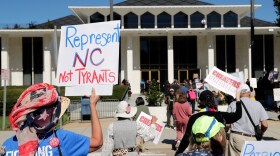The Supreme Court has turned away efforts from Republicans in North Carolina to block state court-ordered congressional districting plans more favorable to Democrats.
In an order late Monday, the justices are allowing maps selected by the N.C. Supreme Court to be in effect for the 2022 elections. The map most likely will give Democrats an additional House seat in 2023.
Last Wednesday, North Carolina voters and advocacy groups urged the U.S. Supreme Court to reject an effort by state Republicans to block that congressional district map.
GOP legislative leaders filed an emergency request on Feb.25 with Chief Justice John Roberts asking that the court set aside the new map while they seek to challenge the ability of the state's judiciary to adjust the lines in light of the U.S. Constitution. They said the delay should be granted because the Constitution directs state lawmakers to determine how U.S. House elections are held.
A three-judge panel adopted congressional boundaries in late February that weren’t enacted by the state House and Senate. The judges said changes were necessary because lines approved by the legislature in mid-February had failed to meet the standards for partisan fairness that the state Supreme Court said is required.
The state justices set those qualifications after declaring that lines drawn by the Republican-controlled General Assembly in November were illegal partisan gerrymanders favoring the GOP in most every political circumstance to win 10 of the state's 14 U.S. House seats.
While the court did not stop the court-ordered plans from being used in this year's elections, four conservative justices indicated they want it to confront an issue that could dramatically limit the power of state courts over federal elections in the future. The Republicans argued that state courts lack the authority to second-guess legislatures' decisions about the conduct of elections for Congress and the presidency.
"We will have to resolve this question sooner or later, and the sooner we do so, the better. This case presented a good opportunity to consider the issue, but unfortunately the court has again found the occasion inopportune," Justice Samuel Alito wrote in a dissent from the Supreme Court's order, joined by Justices Neil Gorsuch and Clarence Thomas.
Justice Brett Kavanaugh made a similar point, but said he didn't want to interfere in this year's electoral process, which already is underway. The filing deadline in North Carolina was Friday.
The state court was involved because of partisan wrangling and lawsuits over congressional redistricting, where the legislature is controlled by Republicans, the governor is a Democrats and the state Supreme Court has a Democratic majority.







